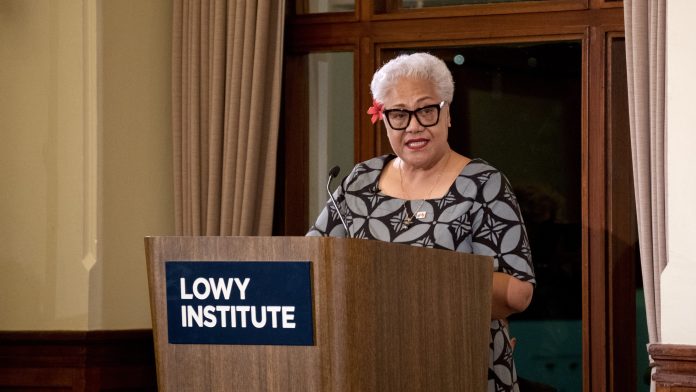Australia and New Zealand should make good on their rhetoric of being part of a “Pacific family” by creating a European Union-style common market in which people could move and work freely across the region, Samoan Prime Minister Fiamē Naomi Mata’afa says.
Mata’afa, who will meet with Prime Minister Anthony Albanese in Canberra on Wednesday, acknowledged her idea was “very contentious” but said it was time to discuss how to deepen integration in the Pacific, a region she described as the “epicentre of contemporary global geopolitics”.
Regarded as one of the most senior Pacific leaders, Mata’afa was tight-lipped on whether her nation supported Australia’s plan to acquire nuclear-powered submarines, saying the issue was “none of my business”.
Mata’afa said she had recently returned from Europe, where the common market allows the free movement of goods, capital, services, and people across national borders.
“I think we need to explore that in the Pacific,” Samoa’s first female prime minister said at an event hosted by the Lowy Institute at Old Parliament House.
Mata’afa said she raised the idea at last month’s Pacific Island Forum and Foreign Minister Penny Wong, who was representing Australia at the event, “didn’t say anything”.
“But the Deputy Prime Minister of New Zealand, who is part Samoan and part Tongan, said, ‘Oh, but all other people in the islands will want to come and live in New Zealand and Australia’.”
Mata’afa said many people would assume this.
“But you might think also that if we have easy access, people can just come do their business, visit their relatives, go on holiday in New Zealand and Australia, but go back home and not have such a difficult time coming into Australia or New Zealand,” she said.
Pat Conroy, the Minister for the Pacific, said the government already had a strong commitment to promoting mobility in the region, including the creation of a green card-style system to bring 3000 Pacific workers into the country every year.
With China and the United States jostling for influence in the region, Fiamē said leaders of larger nations needed to be more respectful of their Pacific counterparts.
“I feel I need to be very frank and say that in the Pacific, we feel our partners have fallen short of acknowledging the integrity of Pacific leadership,” she said.
“Such acknowledgements can simply be in the form of information sharing and open consultation.”
Mata’afa said the “shift in global and regional geopolitics is creating an increasingly complex and crowded region that places the Pacific at the epicentre of contemporary global geopolitics”.
Mata’afa said Pacific leaders did not necessarily accept or understand the concept of the Indo-Pacific, which countries such as Australia and the US increasingly use to frame discussions about the region.
“The Pacific Islands were never consulted around that new narrative, or had a discussion around it,” she said.
“Given that we occupy a very large space of one of those oceans, one might have thought that having some input from the Pacific island might have been a good idea as we moved into that new narrative, but, you know, I think we were quite used to it.”
Mata’afa avoided either endorsing or criticising Australia’s nuclear-powered submarine plan, saying “this is how Australia sees its role in the security aspects of the region, and we understand that”.
But she was grateful to receive a briefing from Australian officials on the matter.
There is a strong opposition to nuclear power in the Pacific Islands, after the region was used as a testing ground for nuclear weapons by the US and other nations in World War Two.
Fijian Prime Minister Sitiveni Rabuka said following a visit from Prime Minister Anthony Albanese last week that he backed AUKUS and Albanese had assured him Australia’s submarine push would not undermine the Treaty of Rarotonga, which declares the South Pacific a nuclear weapons-free zone
SOURCE: SMH/PACNEWS













